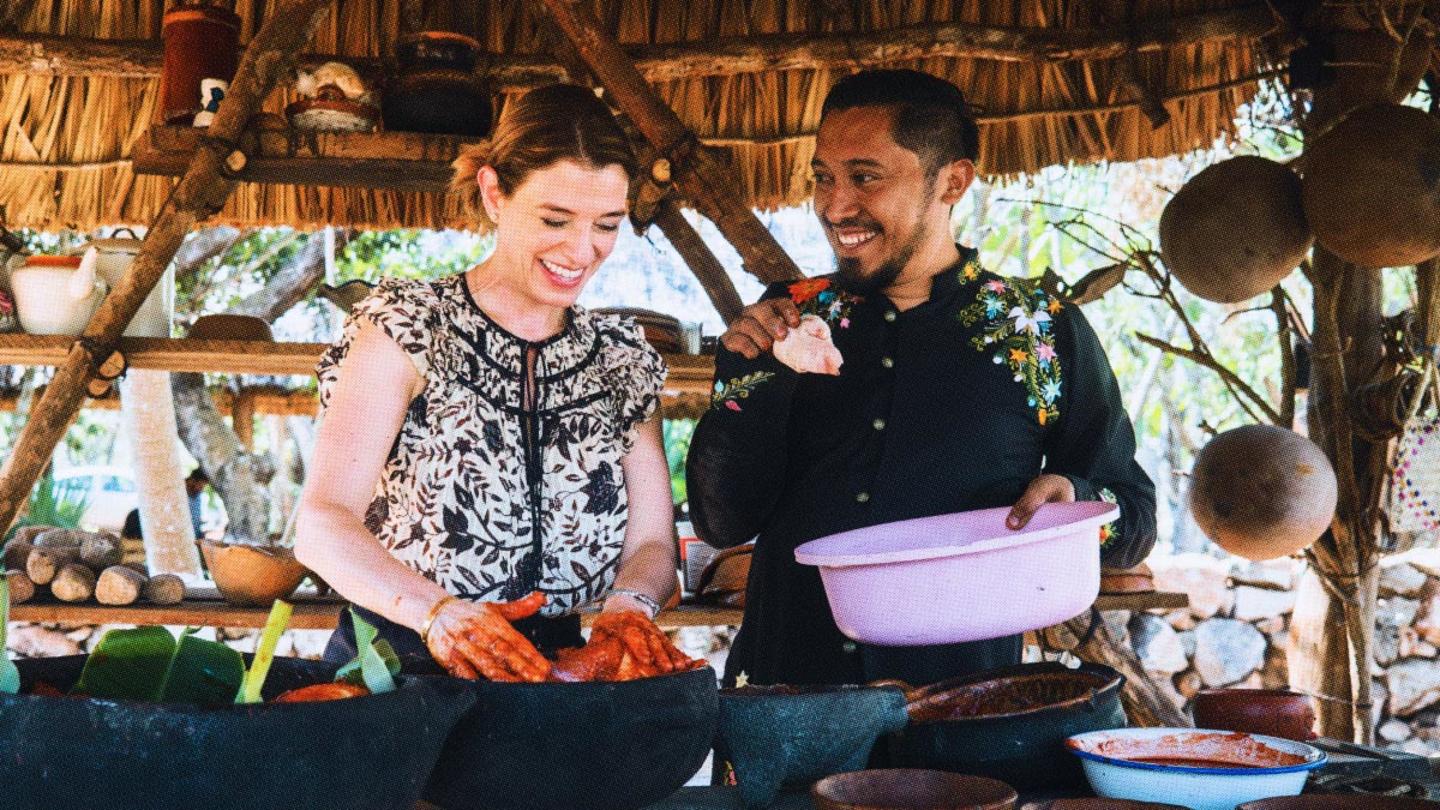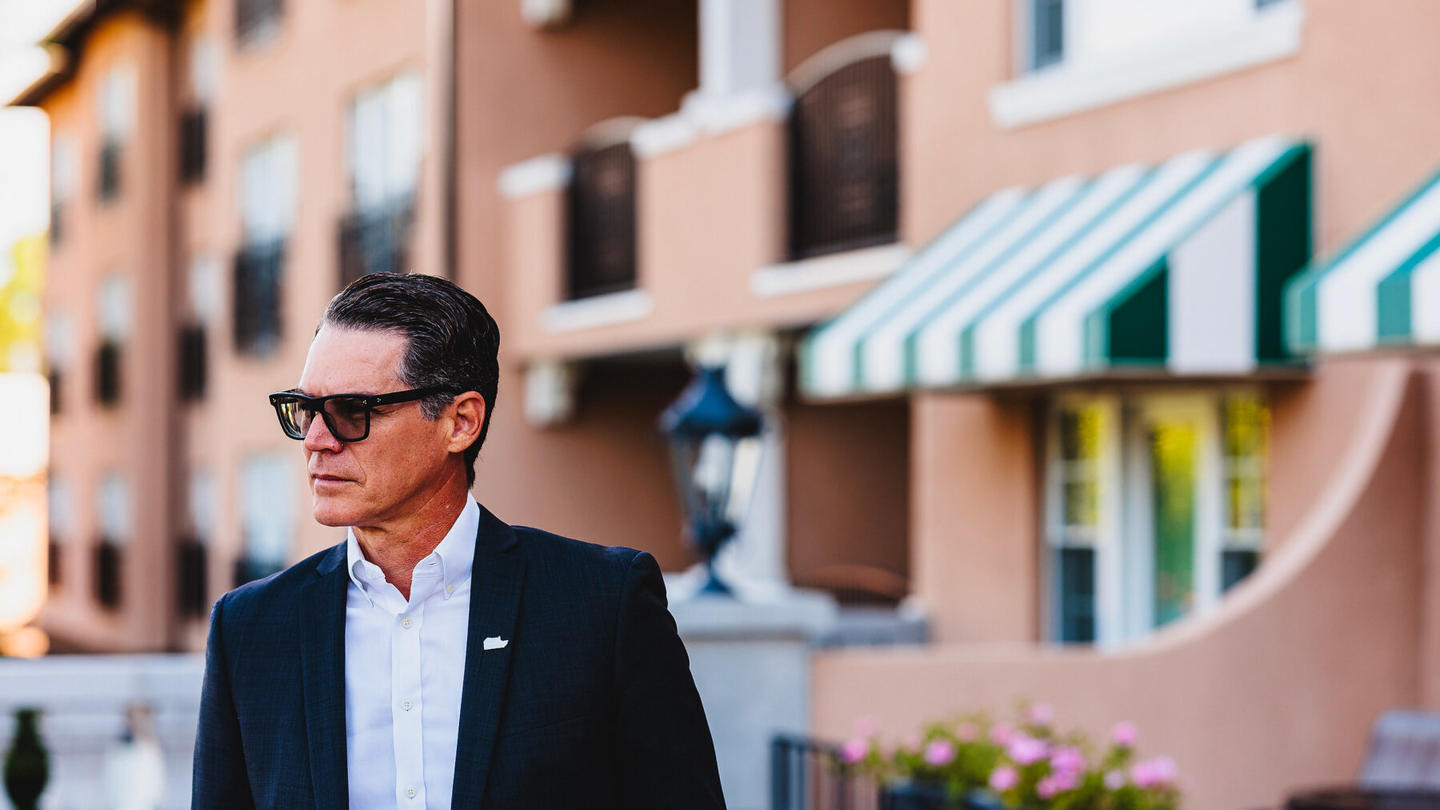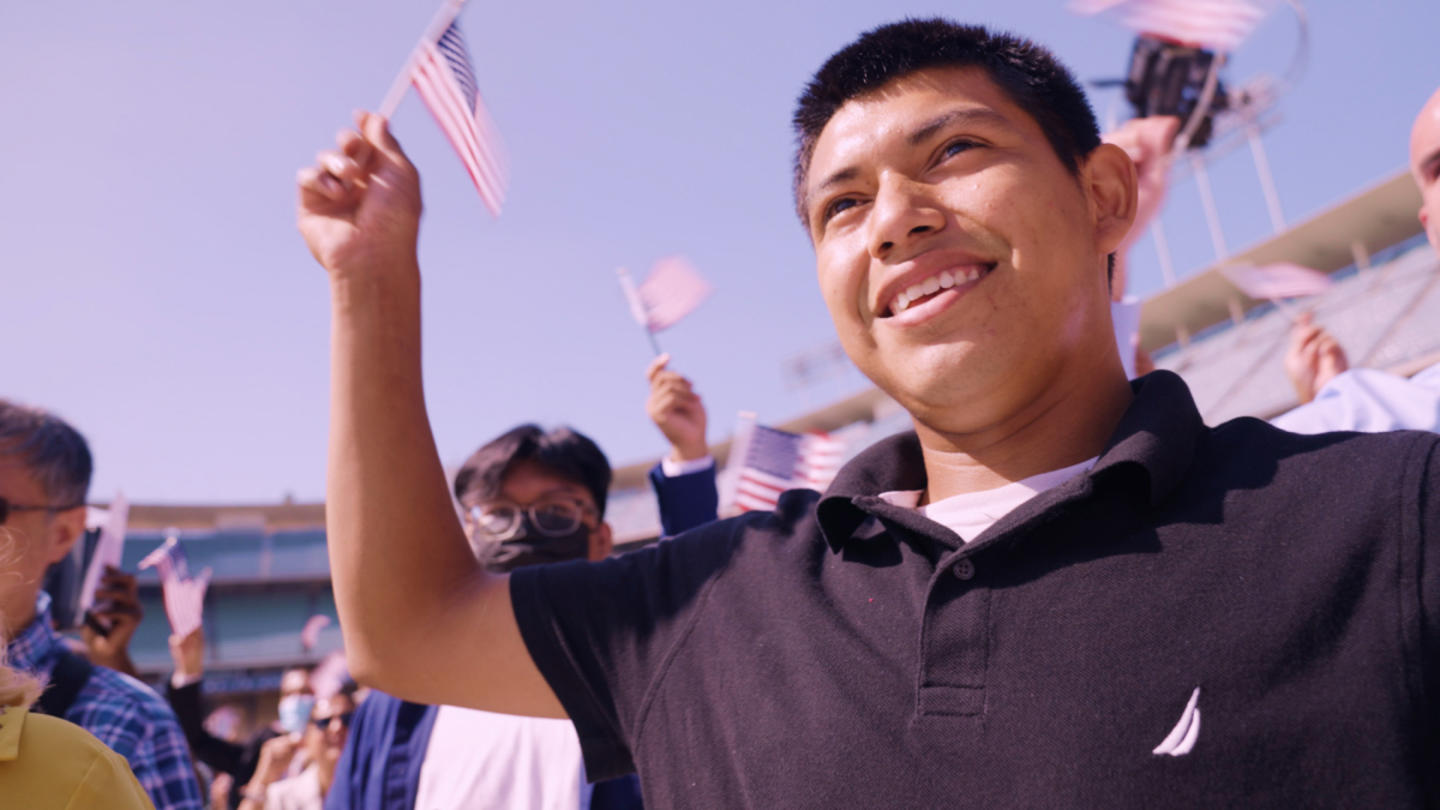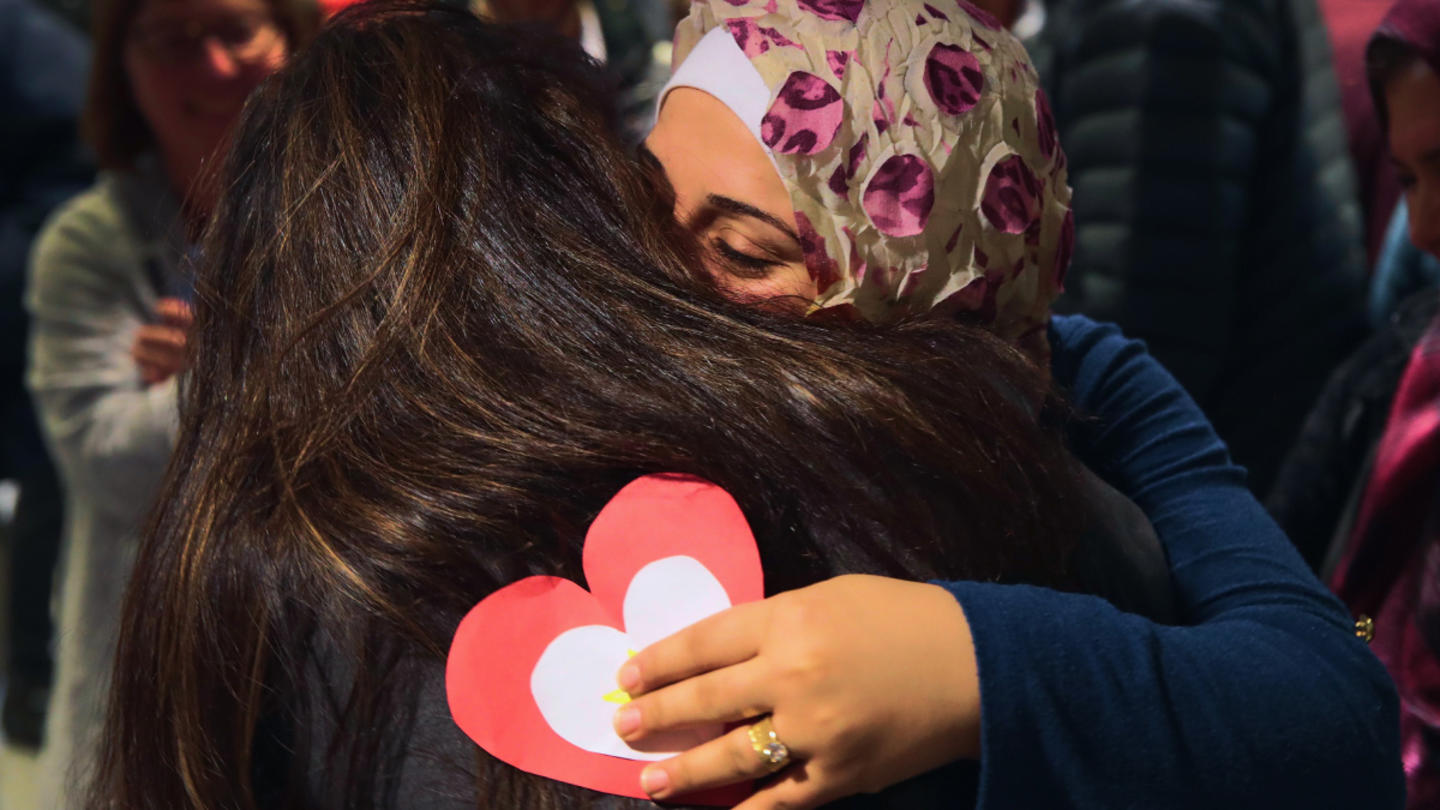Nazanin Ash knows that the life she’s had is a matter of timing and geography. And she knows she’s not alone.
Ash’s parents came to the United States as temporary exchange students in 1973. The Iranian Revolution in 1978 caused them to stay.
“I often think about what’s facing women in Iran today, and how it was the accidents of timing and geography and the ability to be in a country that would afford freedom and protections and an opportunity to rebuild their lives that made my life,” she described. “My contributions, my trajectory would have been totally different if I had been born and raised in Iran as intended. I come to this work with this lens that the accident of timing and geography works in the opposite direction for so many people in the world.”
“This work” is the work of Welcome.US, the organization where Ash serves as CEO. Welcome.US works with people around the country to become sponsors and help resettle refugees — referred to by the organization as “newcomers” — and their families. By pairing everyday Americans with incoming newcomers, Welcome.US is tapping into an underutilized, but powerful force for change: the kindness of communities across the country, from every demographic, who want to help.
In doing so, the organization is upending the persistent narrative that immigration is highly politicized, divisive, and polarizing. As their work shows, the reality is that Americans want to help those seeking legal refuge from conflict, regardless of their political stance on the specifics of immigration policy. And it’s working: Over the last 20 months, Americans have signed up to sponsor more refugees than the whole of the government’s traditional refugee resettlement system has in the last 20 years.
In January 2023, the U.S. Department of State launched the Welcome Corps and deemed it “one of the boldest innovations to U.S. refugee resettlement in 40 years.” Welcome.US is serving as one of the convening partners of the Welcome Corps, which has galvanized over 15,000 everyday Americans to sponsor and house incoming refugees through this one program in the last year alone. As the two-year anniversary of Russia’s invasion of Ukraine approaches this February, creating a still-expanding population of displaced persons, Welcome.US’ work is only becoming more urgent.
“Communities hold so much capacity and willingness to welcome, and what they needed was an opportunity to be unleashed,” said Ash. “[This] holds the keys to unifying our communities and building a sense of cohesion and unity.”
The power to change nationally starts locally
Americans already possess empathy and a drive to help others. Welcome.US is tapping into those traits to find a new solution for refugee resettlement.
To equip local communities with the tools and resources they need to welcome, house, and support newcomers, Welcome.US combines the strengths of the government and private sector — but it is ultimately the openness and dedication of sponsors that is transformational.
“What distinguishes Americans is their willingness to come together and solve problems and not expect governments to do it,” Ash said. “It’s why I call it ‘welcome dot us.’ It’s a purposeful double entendre because it is as much about us as about the people we seek to assist. What we’re about is unleashing the power and potential of our communities … In doing that, we will find a national capacity that vastly exceeds what governments can do alone.”
The American government provides policy parameters that dictate the flow of migration from outside countries, creating “openings for Americans to participate, to make it possible for the people that they sponsor to come here in a safe, orderly way with legal authorization and work limits,” described Ash. Once those foundational tenets are in place, the private sector provides much-needed assistance.
Besides being one of the convening partners of the Welcome Corps, Welcome.US created the Welcome.US CEO Council in April of 2022, a convening chaired by CEOs from 38 major companies and chaired by Google’s Sundar Pichai and Accenture’s Julie Sweet. Their corporate partnerships provide systems that help Americans more easily sponsor beneficiaries. For instance, Lyft may provide transportation; T-Mobile has donated free cell phones; HP has given laptops.
“We turned to American communities and the American private sector to make it work and to scale it,” Ash said.
The overwhelming turnout of the past 20 months has shown just how effective the altruism of local communities can be, once they are empowered with the tools to step up and play a central role. Welcome Fund grants have been distributed to over 240 community organizations in 40 states across the country so far, often including faith-based or veteran-centered organizations.
“This is way more than what we even anticipated,” said Ash. “Americans rushed right in. There are even wait lists to sponsor — something that is not an easy thing to do. It’s not a small responsibility to take on.”
Sign up for the Stand Together newsletter and get stories, ideas, and advice from changemakers to help you tackle America’s biggest problems.
Rather than bipartisan or nonpartisan, Welcome.US is apolitical
The terms “refugee” or “migration” may be shrouded in political rhetoric and legislative speak, but for sponsors and newcomers involved in this program, migration is anything but impersonal.
This is especially true for Viktoriia, who fled from Ukraine with her two sons and found a new home in 2022 with Helen, a two-time sponsor for newly arrived refugees. Viktoriia and her family traveled from Ukraine all the way to Raleigh, North Carolina, where they were welcomed into Helen’s home and became active in local schools, workplaces, and extracurricular activities. Helen’s sponsorship didn’t just make Viktoriia and her family feel welcome: It empowered them and allowed them to connect with the local community, give back, and contribute to their new home.
But despite being tied to international conflicts and political disputes that often produce populations of displaced persons, Welcome.US is not asking their sponsors to take any sort of political stance. The organization is strictly apolitical.
“It is no secret that immigration and welcoming newcomers is one of the most high-voltage political topics in our country right now,” Ash said. “It is perceived as one of the most divisive issues in our politics right now, and what I think we do differently is that we’re not bipartisan. I wouldn’t even call us nonpartisan. We are apolitical.”
Sponsors come from all over the political, religious, and racial spectrum, united by the belief that providing refugees with safety and opportunity is a matter of human empathy, not legislation.
“[Sponsors don’t have to] have an opinion about immigration,” Ash said. “We’re not asking people to sign an advocacy letter or oppose a particular policy or law or political position. We are asking people if they want to help. And overwhelmingly Americans want to help.”
Ash believes that the ability to be apolitical when welcoming and empowering migrants is rooted in a central tenet of American character, one that transcends political differences. Upholding human dignity, she said, goes back much farther than our current environment of polarization.
“Our Constitution was the first to confer human rights and human dignity on the basis of personhood and not citizenship,” she said. “And while there were many failures in the implementation of that Constitution, it’s what made my life possible. It’s what’s made it possible for all of our families somewhere in our history to rebuild our lives and find opportunity here.”
There are currently sponsors in 11,000 zip codes across all 50 states — no group or sector has opted out, Ash emphasized. Welcome.US has appealed to every side of our politics and every corner of our society.
“The sponsors who are participating come from every part of our American tapestry,” Ash explained. “We’re not asking people to say whether people should be able to be safe and have opportunity. We’re saying, ‘Do you want to help someone be safe and have opportunity? Do you want to take an opportunity to have a generational impact on someone’s life?’ And I’ve not met one person yet who says no to that opportunity.”
Safety is needed now more than ever
Viktoriia and Helen’s story is just one example of a growing number of Ukrainians who are increasingly using Welcome.US support to resettle in the United States. As of January 2024, there are over 6.3 million Ukrainians displaced globally, a number that will only continue to rise as the conflict pushes on.
Its new participation in the Welcome Corps, in particular, will enable Welcome.US to be ready to receive any newcomers in a safe, legal, and orderly fashion.
“[Welcome.US] started first as a small pilot program for Afghans, then we were able to break it wide open into a scaled program for Ukrainians,” Ash explained. “Then with the program for Ukrainians, so many people signed up in such a short amount of time that the program was extended to populations in crisis in the Western Hemisphere. And now with the Welcome Corps, it was extended to the global refugee population worldwide. Now Americans can sponsor refugees from any crisis in the world.”
Through sponsorship, Americans are demonstrating the tangible impacts that their capacity for goodwill can have — once they are provided with the resources and opportunity to use it. Ash hopes that as more people take part in sponsorship, the transformational power of local communities will become recognized on a national scale.
“[People] need to know what this tremendous movement is. They need to know what its potential is to deliver enormous benefits,” she said, “not just for newcomers and their families, but for communities that are privileged to welcome them and for our country as a whole.”
Welcome.US is supported by Stand Together Foundation, which partners with the nation’s most transformative nonprofits to break the cycle of poverty.
Learn more about Stand Together’s immigration efforts, and explore ways you can partner with us.

Thanksgiving is celebrity chef Pati Jinich’s favorite American holiday. It’s easy to see why.

Daniel Garza worked alongside his immigrant parents as farmworkers. He used that work ethic to rise to a position in the White House.


Path United is turning mobile home communities into springboards for success for immigrant families.
